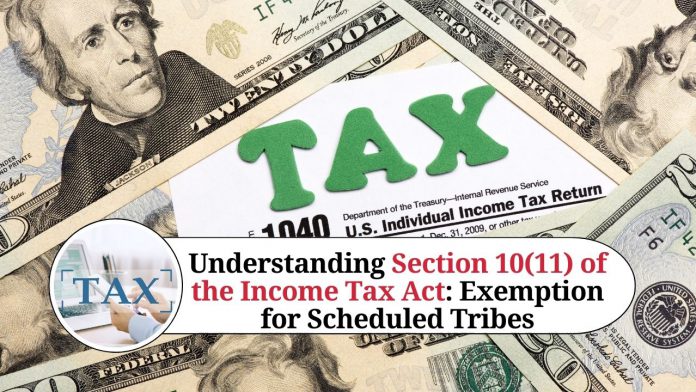Section 10(11) of the Income Tax Act provides an exemption on the income received by an individual who is a member of a recognized Scheduled Tribe (ST) in India. The income that is exempt under this section includes any income arising from any source, such as salary, business income, capital gains, or other sources of income.
Exemption for Scheduled Tribes
To claim this exemption, the individual must be a member of a recognized Scheduled Tribe. The term ‘Scheduled Tribe’ refers to the tribes or communities that are listed as such in the Schedule of the Constitution (Scheduled Tribes) Order, 1950. These tribes are recognized by the government of India as socially and economically disadvantaged.
The exemption under Section 10(11) is granted to members of Scheduled Tribes to promote their social and economic well-being. By exempting their income from tax, the government aims to encourage them to participate in various economic activities and promote their economic development.
It is important to note that the exemption under Section 10(11) applies only to individuals who are members of recognized Scheduled Tribes. It does not apply to the income of the tribe as a whole or to any other entity associated with the tribe. Moreover, the exemption is available only to individuals who earn income. If the income is earned by an association of persons or a body of individuals, the exemption will not be applicable.
In addition to Section 10(11), other provisions in the Income Tax Act provide tax benefits to individuals who belong to Scheduled Tribes. For instance, Section 80DD provides a deduction for expenses incurred on the medical treatment of a disabled dependent who is a member of a Scheduled Tribe. Similarly, Section 80GGA provides a deduction for donations made for scientific research or rural development in areas predominantly inhabited by Scheduled Tribes.
Claiming Exemption under Section 10(11)
To claim the exemption under Section 10(11), the individual must furnish proof that they are a member of a recognized Scheduled Tribe. This can be done by producing a certificate issued by the competent authority certifying that the individual belongs to a Scheduled Tribe.
In case the certificate is not available, the individual can produce other documents such as a voter ID, ration card, or other relevant documents to prove their membership in a Scheduled Tribe.
Final Conclusion
Section 10(11) of the Income Tax Act provides an important tax benefit to individuals who are members of recognized Scheduled Tribes. The exemption is granted to promote the social and economic development of Scheduled Tribes by encouraging them to participate in various economic activities.
To claim this exemption, it is essential to establish that the individual belongs to a recognized Scheduled Tribe. Additionally, claiming exemption without being a member of a Scheduled Tribe can result in penalties and fines. Hence, individuals should ensure that they meet all the eligibility criteria before claiming the exemption.
Read more useful content:
Frequently asked questions (FAQs) about Section 10(11) of the Income Tax Act:
Q: Who is eligible to claim the exemption under Section 10(11)?
A: Only individuals who are members of a recognized Scheduled Tribe are eligible to claim the exemption under Section 10(11).
Q: What types of income are exempt under Section 10(11)?
A: Any income earned by an individual who is a member of a recognized Scheduled Tribe is exempt under Section 10(11). This includes income from all sources such as salary, business income, capital gains, or other sources of income.
Q: What is the process to claim an exemption under Section 10(11)?
A: To claim an exemption under Section 10(11), the individual must provide proof that they are a member of a recognized Scheduled Tribe. This can be done by producing a certificate issued by the competent authority certifying that the individual belongs to a Scheduled Tribe.
Q: What happens if an individual wrongfully claims exemption under Section 10(11)?
A: Wrongfully claiming exemption under Section 10(11) without being a member of a Scheduled Tribe is a punishable offense. If an individual is found to have wrongfully claimed this exemption, they can be penalized for tax evasion under the Income Tax Act.
Q: Are there any exemption limits under Section 10(11)?
A: There are no specific exemption limits under Section 10(11). The entire income earned by an individual who is a member of a recognized Scheduled Tribe is exempt from tax.
Q: Are there any other tax benefits available to Scheduled Tribes?
A: Apart from the exemption under Section 10(11), other provisions in the Income Tax Act provide tax benefits to individuals who belong to Scheduled Tribes. For instance, Section 80DD provides a deduction for expenses incurred on the medical treatment of a disabled dependent who is a member of a Scheduled Tribe. Similarly, Section 80GGA provides a deduction for donations made for scientific research or rural development in areas predominantly inhabited by Scheduled Tribes.
Q: How can an individual know if they belong to a Scheduled Tribe?
A: An individual can check if they belong to a Scheduled Tribe by referring to the Schedule of the Constitution (Scheduled Tribes) Order, 1950. Alternatively, they can approach the competent authority to obtain a certificate certifying that they belong to a Scheduled Tribe.
Q: Is the exemption under Section 10(11) available to all Scheduled Tribes?
A: The exemption under Section 10(11) is available only to individuals who belong to a recognized Scheduled Tribe. The list of recognized Scheduled Tribes is provided in the Schedule of the Constitution (Scheduled Tribes) Order, 1950.




















